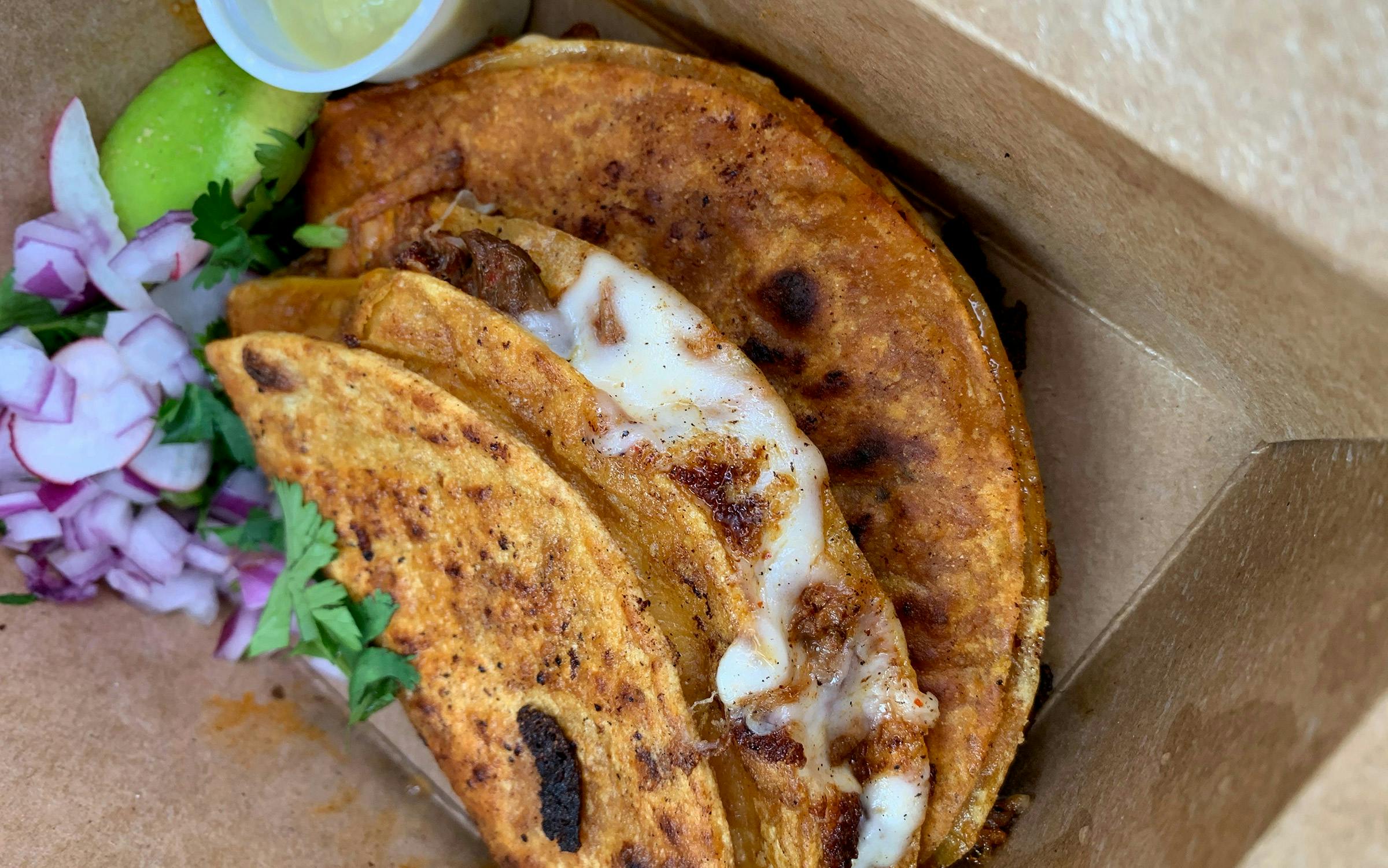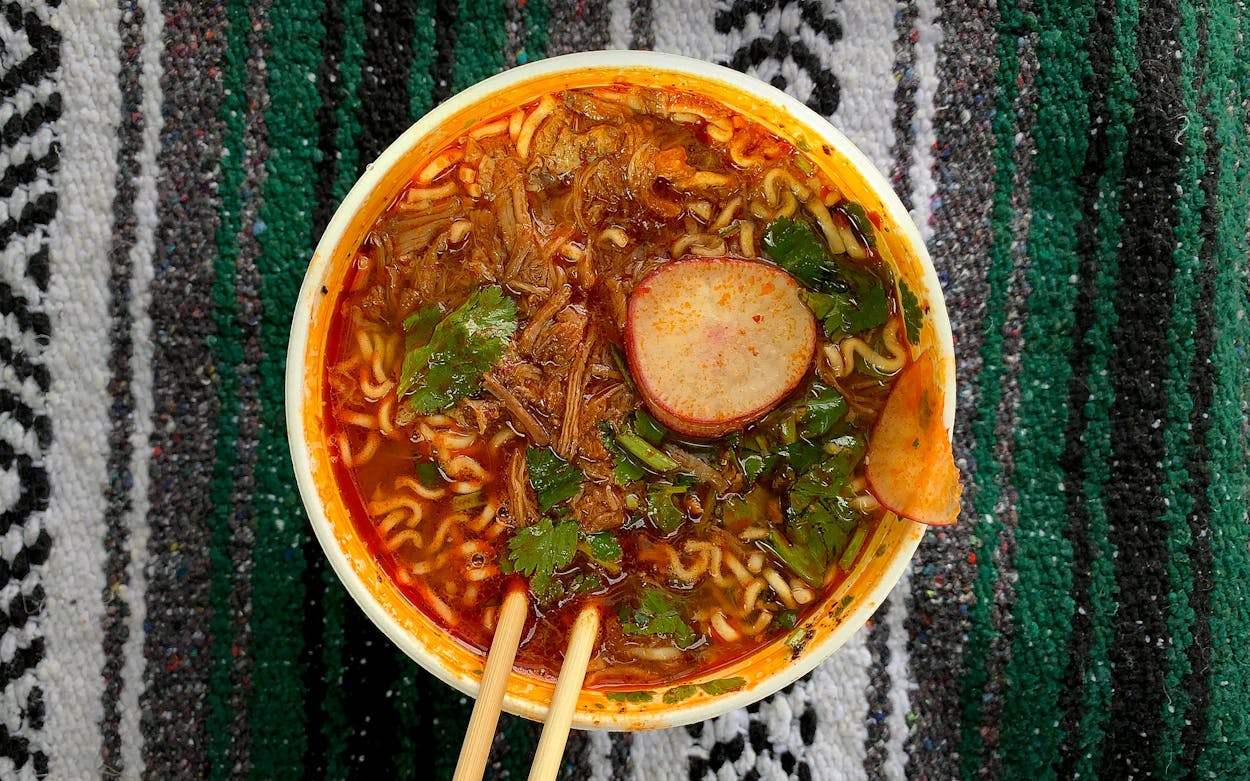Fort Worth is dotted with plainly decorated white taco trucks. They’re stationed in supermarket parking lots, next to gas stations, and anywhere else there is space for a mobile food rig. Many sell the standard pork-beef-chicken options. Some advertise trompos. Few are as noteworthy as Calisience, a nearly year-old taco truck that’s tucked into the back of a concrete and gravel lot in the city’s Riverside neighborhood. A near-constant stream of cars can often be seen turning into Calisience’s lot on Belknap, just past an AutoZone store and across the street from a Mexican bakery. In those cars—mostly pickup trucks—customers wait in a drive-through line until they pull up in front of the truck. That’s where owner Jacqueline Anaya takes cash-only orders. On a recent Saturday afternoon, just over an hour went by from the time my family and I got in line to when we took our first bites. The food is well worth the wait.
I’d wait even longer for Anaya’s tacos dorados. When separated, the crisped, red-tinged, char-spotted tortillas reveal a layer of stubby threads of chopped beef birria on a swath of melted, slightly milky and salty Monterey Jack cheese. Make sure to finish the tacos with the provided flurries of chopped cilantro, raw white onions, squirts of lime, and plops of thick and punchy salsa verde. The crunch of the hot-to-the-touch tacos and the layering of flavors and textures are a family tradition: Anaya uses a recipe adapted from that of her grandmother, who grew up in Guadalajara. The result is delightful, rife with guajillo chiles, clove, and other earthy spices.
Birria tacos are traditionally served with consommé on the side for dipping. That’s available at Calisience, but you’d be crazy not to opt instead for the birria ramen entrée. Its base is the chest-warming consommé, and the recipe is a Calisience original. Birria ramen might sound like a wild new invention, but there’s a precedent for it: maybe you’ve seen Tapatío-branded instant ramen noodles at big-box stores such as Walmart and Costco, and available via Amazon. You might have requested the dish at one of the state’s myriad peddlers of birria de res. I’ve happily slurped several bowls of Tapatío birria ramen at a few taquerias in Texas. It seems to be the favored brand. When El Remedio began offering it in 2018, the San Antonio trailer couldn’t keep enough in stock. Tejas Birria in Buda also sells it.
Birria ramen combines two widely beloved foods from different traditions: birria de res, the slow-cooked consommé preparation from Jalisco, Mexico, now sweeping taco trucks nationwide, and instant noodles, which have been a global hit since Taiwanese-Japanese entrepreneur Momofuku Ando introduced them in 1971. The Tapatío-brand product is produced in partnership with Southern California–based Tapatío hot sauce and the Korean American United Exchange Corporation (UEC). It’s also the first such ramen. If Korean involvement seems odd for a food closely associated with Japanese gastronomy, consider that more people per capita in Korea eat ramen than in any other country in the world. The packaged hybridization fits into the Korean-Mexican culinary tradition first popularized by Los Angeles chef Roy Choi and his Kogi BBQ food truck in 2008. Tapatío Ramen’s story begins in 2017 when UEC president Carol Choi approached the owners of Tapatío, the founding Saavedra family. A year later, the two parties had perfected their recipe and rolled it out across Southern California and beyond. At Calisience, Anaya names these fusion instant noodles as an influence. She likes them, but she prefers to do her own thing.

Her own thing is glorious: a Styrofoam bowl filled with noodles and beef shoulder in consommé speckled with cilantro, onion, and sliced radish, served with wooden chopsticks and plastic forks. This comforting dish is also worth fighting over. I realized that when my twelve-year-old son and I began arguing about whose turn it was to eat Calisience’s birria ramen. That’s when I knew I was experiencing something special. My son never wants to try anything when he’s riding with me. For Anaya, that aha moment came when she first saw the line of customers’ cars wrapped around a corner of the adjacent street. That was last summer, shortly after local media profiled the unassuming food truck.
The line extended down the block beyond the Riverside stoplight. “That’s when it was like, boom,” she told me over a Zoom call. “I couldn’t believe it. I didn’t know how to handle it. I was super nervous.” Anaya, a single parent who previously sold tacos and seafood dishes from her Fort Worth home, had hoped to scale the business slowly. Her overnight success was exciting and overwhelming. “I was happy only to be able to pay my bills and be there for my son, and then 2020 was the best year of my life,” she says.
Calisience is built on Anaya’s family recipes that include seafood dishes from Sinaloa, Mexico. The name is a portmanteau made from the name of her native state (she’s from Los Angeles) and “ence,” which is similar to Spanish for “from” or “of.” A person from Jalisco is a jalisciense; a person from Sinaloa is a sinaloense. The name honors her roots, and the various dishes honor Anaya’s curiosity, which is informed by what her customers want.
Increasingly, they want birria de res. The preparation continues to reign supreme as a culinary trend. Anaya and her team make 90 pounds of birria every weekday and up to 120 pounds per day on weekends. The broth is cooked for seven to ten hours. On a typical day, thirty bowls of birria ramen sell out in mere hours. On a chilly winter day, Anaya can sell close to fifty orders. Customers also want more of Anaya’s seafood, which they’ll soon get with her second venture, Cali Mar. Now in the final stages of preparation, Cali Mar will sit next to Calisience and feature Sinaloa specialties like tacos gobernadores, crispy tortillas crammed with cheese and brimming with shrimp; tostadas stacked with crab and shrimp and finished with quick lashes of a spicy cream-based salsa; and rolls of Mexican sushi.
Calisience sold out of food in two hours on its first day of service: February 1, 2020. “I thought that maybe my friends or family were going to show up, but I had people that I didn’t know show up,” Anaya remembers. “So I was really, really impressed and really happy.” The business’s growth during the pandemic is a testament to her talent and hard work. With Cali Mar, Anaya will likely discover that if 2020 was the best year of her life, 2021 might be even better.
Calisience
3318 E. Belknap, Fort Worth
Hours: Wednesday–Saturday 11 a.m. to 4 p.m.
Editor’s note: Cash only
- More About:
- Tacos
- Birria
- Fort Worth








